GRADUATE STUDENT
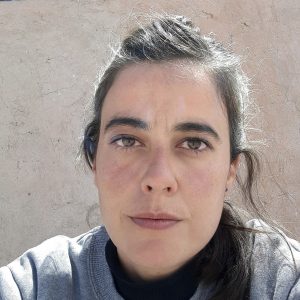 CASAGRANDA, Elvira
CASAGRANDA, Elvira
(Post-doctoral fellow at CONICET)
I currently investigate the spatiotemporal dynamics of Ormiscodes amphimone outbreaks in lenga (Nothofagus pumilio) forests of southern Patagonia. I use satellite-based time series to track vegetation and characterize the dynamics and spatial extent of defoliation events. Previously, my doctoral thesis focused on the Argentine Puna ecosystem, where I studied the functioning of high-Andean wetlands and their interactions with mining activities and climate change using spatial analysis and remote sensing tools. Overall, my work addresses the ecology and monitoring of Andean ecosystems, integrating socio-ecological approaches and quantitative methods to understand processes and vulnerabilities in these environments.
〈 RESEARCH GATE 〉 〈 GOOGLE ACADEMIC 〉
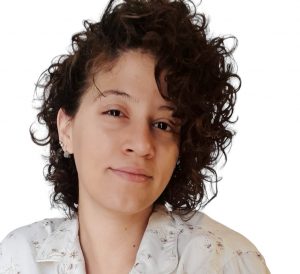 DIP, Alejandra Belén
DIP, Alejandra Belén
(Post-doctoral fellow at CONICET)
I am a Magister in Neotropical Biodiversity and iam Ph.D. in Biology. I have experience in plant community ecology and ethnobotany in the Monte Desert. During my postdoctoral fellowship, I began working on the restoration of native woody species in agricultural systems in the Espinal region of central Argentina. My research focuses on evaluating their potential in terms of individual performance, associated biodiversity, and the provision of ecosystem services.
〈 RESEARCH GATE 〉 〈 GOOGLE ACADEMIC 〉
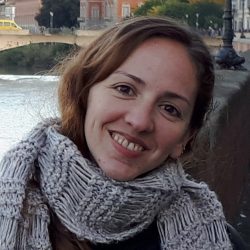
FERNANDEZ, Romina Daiana
(Post-doctoral fellow at FONCyT)
My research focuses on exploring the socio-ecological causes and consequences of biological invasions across different spatial scales and ecosystems, with special attention to invasive exotic plants and their impact on ecosystem functioning. I am also interested in studies on litter decomposition and nutrient cycling, aiming to understand how different climates and land uses influence the factors regulating these processes and how these interactions shape their dynamics at both local and global scales.
〈 RESEARCH GATE 〉 〈 GOOGLE ACADEMIC 〉
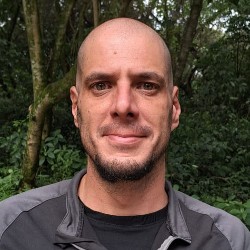 GARCÍA DIAZ, Pablo
GARCÍA DIAZ, Pablo
(Post-doctoral fellow at CONICET)
I am an applied ecologist with extensive experience and broad interests in ecology and conservation, ranging from the use of models to understand the spatiotemporal dynamics of vertebrate and plant communities, to invasion ecology and management, the effects of disturbance on forest community dynamics, and wildlife trafficking. I also serve as an Associate Editor for Conservation Science and Practice and Animal Conservation. My CONICET strategic-themes postdoctoral fellowship focuses on establishing the socio-ecological basis for managing exotic vertebrate species and woody plant invaders in Tucumán Province (Argentina). To this end, I am compiling databases on the distribution and status of these species, developing ecosystem-dynamics models, and implementing management actions in collaboration with government agencies and NGOs.
〈 RESEARCH GATE 〉 〈 GOOGLE ACADEMIC 〉
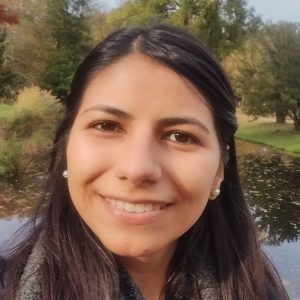 JIMÉNEZ, Yohana Gisell
JIMÉNEZ, Yohana Gisell
(Post-doctoral fellow at CONICET)
My research focus is centered on the dynamics of the Anthropocene and how the interaction between society and nature influences the emergence of novel ecosystems. Currently, I am analyzing the role that crop diversity plays in productive resilience. Furthermore, I study ecosystem services and disservices at the local level in an urbanization of the Tucuman foothills with the aim of contributing to informed decision-making in the area.
〈 RESEARCH GATE 〉 〈 GOOGLE ACADEMIC 〉
 VALOY, Mariana
VALOY, Mariana
(Post-doctoral fellow at CONICET)
My interest encompasses biotic interactions, specifically the ecological and evolutionary mechanisms that shape the interactions between organism in different scenarios. My current project is centered on exploring potential benefits and applications of “Multilevel Selection” in a regional agricultural system focused on quinoa cultivation. This is being investigated as a possible strategy for sustainable management within agroecosystems.
〈 RESEARCH GATE 〉 〈 GOOGLE ACADEMIC 〉
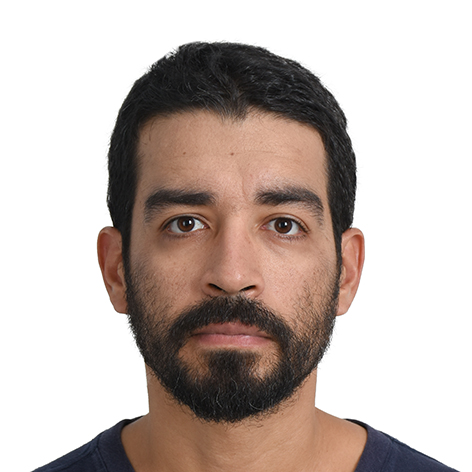
VÁSQUES ORDÓNEZ, Aymer Andrés
(Post-doctoral fellow at CREA)
I research biotic interactions in tropical and subtropical ecosystems and delve into biodiversity management and conservation at different spatial and temporal scales. My postdoctoral project seeks to identify geospatial metrics for remote monitoring of biodiversity indicators in the agroecosystems of the Gran Chaco, with the aim of promoting their conservation.
〈 RESEARCH GATE 〉 〈 GOOGLE ACADEMIC 〉
DOCTORAL FELLOWS
 ANDRADA, Franco D.
ANDRADA, Franco D.
(PhD fellow at CONICET)
I am interested in the study of interaction ecology, particularly in the study of plant-animal interactions, and how different environmental variables can modify these interactions. The objective of my thesis is focused on plant-pollinator interactions in the ecosystem “Monte” of northwestern Argentina, on an altitudinal gradient, where I will try to clarify how environmental variables which are expected to change with climate change might affect the dynamics and structure of interactions.
〈 RESEARCH GATE 〉 〈 GOOGLE ACADEMIC 〉
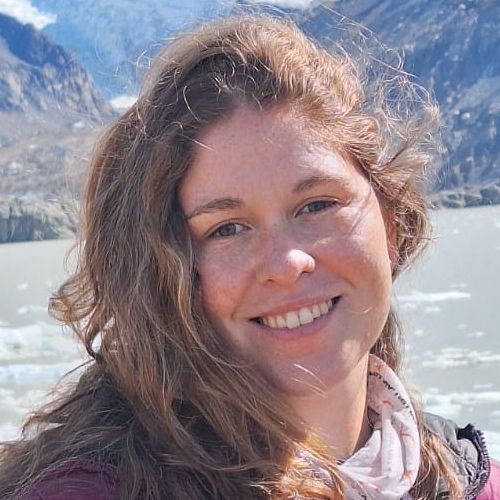 ASTRADA POVIÑA, Maria Jimena
ASTRADA POVIÑA, Maria Jimena
(PhD fellow at CONICET)
Invasive species can profoundly alter ecosystem dynamics, affecting both biodiversity and ecological processes. Ligustrum lucidum, a widespread exotic species in the Yungas, has been identified as having significant impacts on forest structure and functioning. During my Ph.D., I will study population dynamics with a focus on the early developmental stages of both native and exotic woody species in successional forests of the Southern Yungas, evaluating how these are influenced by ecological conditions in the context of biological invasions, using Ligustrum lucidum as a model invasive species. To this end, I will analyze demographic traits such as growth, mortality, and recruitment, as well as the influence of ecological variables (including light availability, soil moisture, and canopy structure) on tree regeneration and growth across different successional stages of the forest.
〈 RESEARCH GATE 〉 〈 GOOGLE ACADEMIC 〉
 CASTILLO, Silvio Eugenio
CASTILLO, Silvio Eugenio
(PhD fellow at FONCYT)
I am interested in the ecology of plant-animal interactions and their adaptation to different and changing local contexts. My efforts will be put in studying the contribution of pollinators in soybean agroecosystems in the semi-arid Chaco. I will evaluate the diversity and activity of insects on crop production, in relation to landscape variables. I am also interested in exploring the automation of interaction sampling as an alternative method to traditional ones.
〈 RESEARCH GATE 〉 〈 GOOGLE ACADEMIC 〉
 DIP YORDANOFF, Ana Lucía
DIP YORDANOFF, Ana Lucía
(PhD fellow at CONICET)
My PhD project focuses on understanding how family farms’ social decision-making shapes changes in the persistence and management of extensive livestock husbandry in the ecosystems “Monte de Sierras” and “Bolsones”of northwestern Argentina (NOA). Using a socio-ecological approach, I aim to identify how multiple drivers (e.g., rural-to-urban migration, the emergence of new employment opportunities, the establishment of alternative productive activities, the role of protected areas, and human–wildlife interactions) influence decisions to reduce or abandon extensive livestock rearing.
〈 RESEARCH GATE 〉 〈 GOOGLE ACADEMIC 〉
 ESCALANTE, Karen
ESCALANTE, Karen
(PhD fellow at CONICET)
I work in monitoring the health and genetics of honey bees. I focus on various natural mating sites of the species, which present particular characteristics at the landscape level. By comparing drones sampled from these sites, with worker bees sampled from an experimental apiary, we can analyze different pathogens, such as viruses, mites and microsporidia. In addition, we can determine the genetic haplotypes present in different ecoregions of the province of Tucumán, as well as in three provinces of Argentina with an important beekeeping activity (Entre Ríos, Bs. As., Tucumán). This allows us to monitor the health and genetics of honey bees in these places. This is important because the species has a fundamental primary role as a pollinator of many plant species, and the production of their derivatives (i.e., honey, propolis, wax, royal jelly and pollen) are important activities for the region.
〈 RESEARCH GATE 〉 〈 GOOGLE ACADEMIC 〉
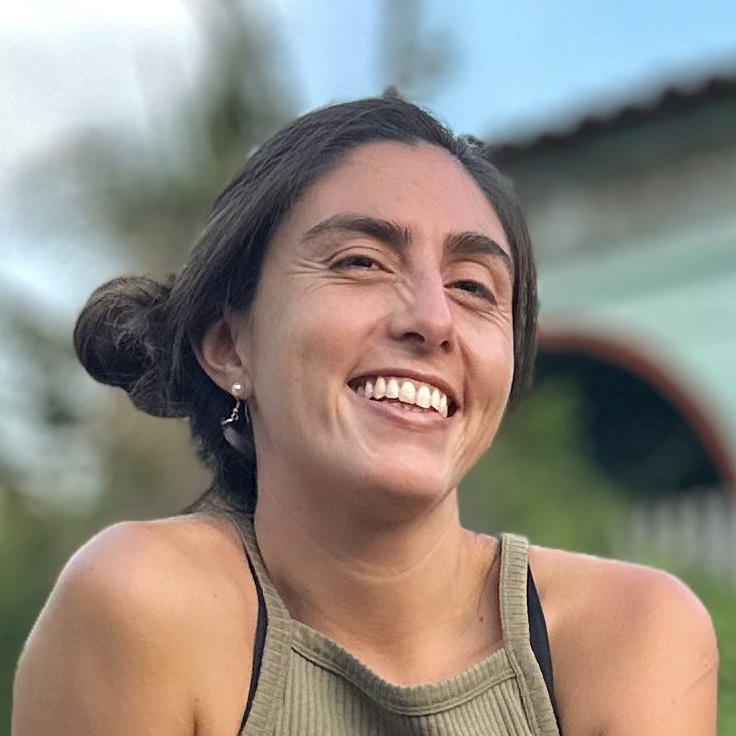 FERRO FRANCO SOSA, Agostina
FERRO FRANCO SOSA, Agostina
(PhD fellow at CONICET)
Environmental problems cannot be analyzed or understood without considering their social context. In this framework, my doctoral study focuses on identifying and quantifying the socio-ecological drivers, both local and remote, of both the use and regime of fire in South America. Subsequently, I will focus on the Argentine Dry Chaco and make an integration of the fire’s regime into management reports.
〈 RESEARCH GATE 〉 〈 GOOGLE ACADEMIC 〉
 GONZALEZ, Virginia
GONZALEZ, Virginia
(PhD fellow at CONICET)
I believe that cities are very complex and fascinating systems: they include processes with so many social actors, that it seems a challenge to me to try and explain them. Since I was a student, I am interested to get involved in projects that address this system and I hope to continue this line of research in my doctorate. Cities are centers of socioeconomic and political power that have an impact on the global ecosystem. During my doctorate, I will study the eastern slope of the tropical Andes in order to understand the urbanization process of intermediate cities, their driving factors (socioeconomic and biophysical), as well as determining the socioenvironmental impacts and conflicts that arise. In this region cities were founded during a gradual and late process, and their locations were based on distant centers of power near the sea. This gradual foundation allows me to study these cities as a chrono sequence of development and determine where the urbanization process is headed, constituting an ideal model to study the anthropic impact on one of the least known and most threatened systems in the tropics.
〈 RESEARCH GATE 〉 〈 GOOGLE ACADEMIC 〉
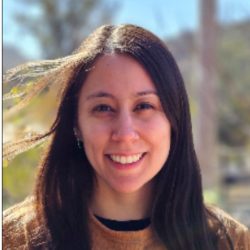 JOZAMI, A. CAROLINA
JOZAMI, A. CAROLINA
(PhD fellow at CONICET)
During my Ph.D., I will investigate how different agricultural management practices in lemon and blueberry crops in the foothills of Tucumán affect soil organism diversity and function, as well as the productivity and health of Apis mellifera hives. These groups of organisms are linked to regulating services, including nutrient cycling and pollination.
〈 CV 〉 〈 RESEARCH GATE 〉 〈 GOOGLE ACADEMIC 〉
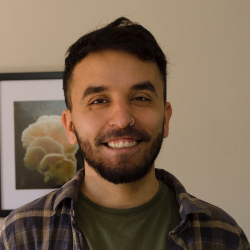 MATIAS, Emiliano
MATIAS, Emiliano
(PhD fellow at CONICET)
In general terms, my main question is how demographic and ecological processes interact. In this context, my Phd study focuses on evaluating the recovery of biodiversity in areas where extensive livestock practices are declining, in northwestern Argentina. This project aims to provide relevant information for land use and planning initiatives in productively marginal areas with a significant relevance for conservation.
〈 RESEARCH GATE 〉 〈 GOOGLE ACADEMIC 〉
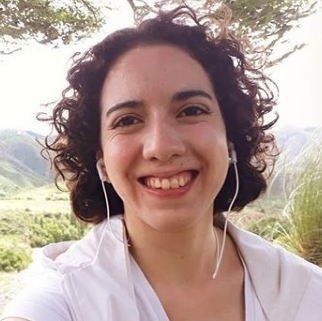 RUIZ BARRIONUEVO, Juliana María
RUIZ BARRIONUEVO, Juliana María
(PhD fellow at CONICET)
Plastic pollution is a problem that mobilizes nations and scientists around the world in search of alternatives and mitigation strategies. In recent years, it has been discovered that certain insects are capable of consuming plastic and biodegrading it with the help of their gut microbiota. Although this process does not represent a magical solution to plastic pollution, from a biotechnological point of view it has a lot of potential. I am currently studying wax moth larvae (Galleria mellonella L. and Achroia grisella F.) that can consume and biodegrade plastics. During my Ph.D., I seek to deepen the understanding of this phenomenon: which plastics can biodegrade, how the gut microbiota varies according to diet, and the biological consequences of plastic consumption in the following generations of larvae.
〈 RESEARCH GATE 〉 〈 GOOGLE ACADEMIC 〉
 SARAVIA, Alejandro Nicolás
SARAVIA, Alejandro Nicolás
(PhD fellow at CONICET)
The natural environment and society are two intimately related systems, and their different components interact to produce different outcomes. My specific interest lies in how societies use the land, the motivations for such use, and their ecological consequences. In this context, my doctoral research aims to analyze the social, economic, and environmental causes of land use in Northwestern Argentina, in order to model future land use scenarios and spatialize them.
〈 RESEARCH GATE 〉 〈 GOOGLE ACADEMIC 〉
 VILLALBA, Natalí
VILLALBA, Natalí
(PhD fellow at CONICET)
Throughout my career, I have focused on entomology and its relevance in agronomy. Since agricultural intensification is one of the main drivers of biodiversity loss, I aim to study which agricultural and landscape management practices enhance insect diversity and the provision of ecosystem services such as pollination and pest control. I will also explore how these services are interrelated and their connection with the (dis)service of herbivory. This study will be conducted in Citrus crops located in the foothills of the Yungas region.
〈 RESEARCH GATE 〉 〈 GOOGLE ACADEMIC 〉
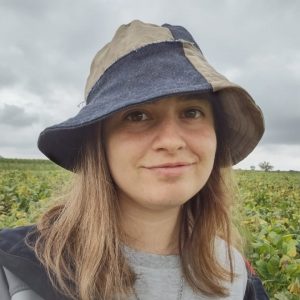
SPINELLI, Catalina
(PhD fellow at CONICET)
I'm interested in urban ecology and the interdisciplinarity between sciences, especially how biology and social sciences can be integrated to understand socio-ecological processes. In my PhD, I will study open-dumps (OD) in Tucumán, focusing on the impact of air and water pollution on environmental health. To do this, I will select and monitor representative ODs outside the metropolitan area, analyzing their surroundings using remote sensing and cartography. Additionally, I will develop socio-environmental risk indicators to identify vulnerable areas and generate tools to support decision-making.
〈 RESEARCH GATE 〉 〈 GOOGLE ACADEMIC 〉
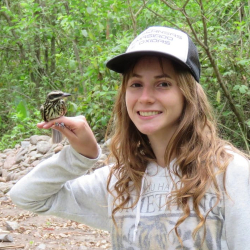 Lic. ZELAYA, María Josefina.
Lic. ZELAYA, María Josefina.
(PhD fellow at CONICET)
Biology is extremely broad, and researching any branch of it is surprising. Still, ornithology is my area of interest. Studying birds, their diet, behavior, and general ecology is truly exciting. It seems that frugivorous birds seek to achieve a nutritional optimum by mixing complementary foods. However, this can be limited by environmental degradation which affects directly birds diet, and indirectly the nutritional balance obtained by birds after eating. That is why, in my doctorate, I intend to evaluate the impact of environmental degradation on frugivorous birds through changes in the nutritional balance of the diet and indicators of their health.
〈 RESEARCH GATE 〉 〈 GOOGLE ACADEMIC〉